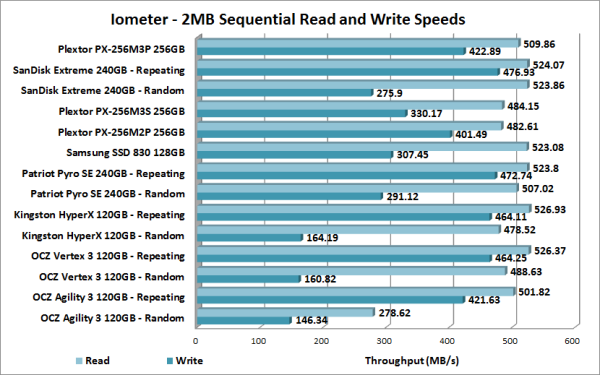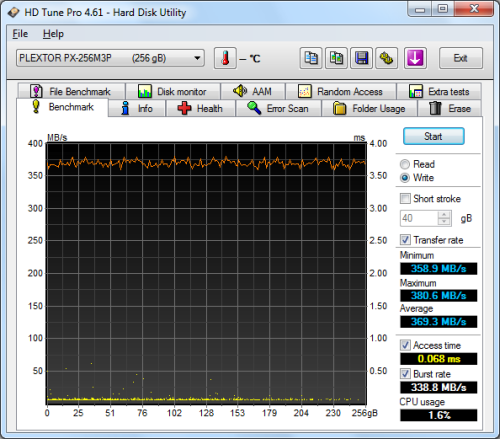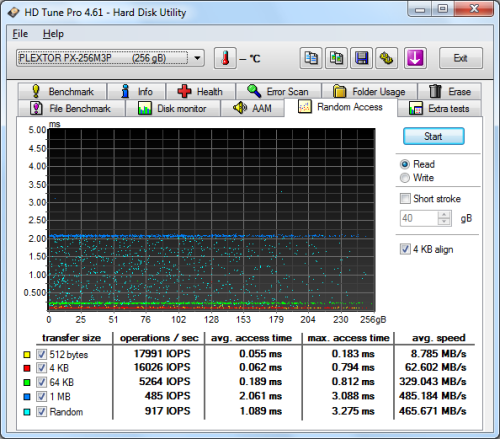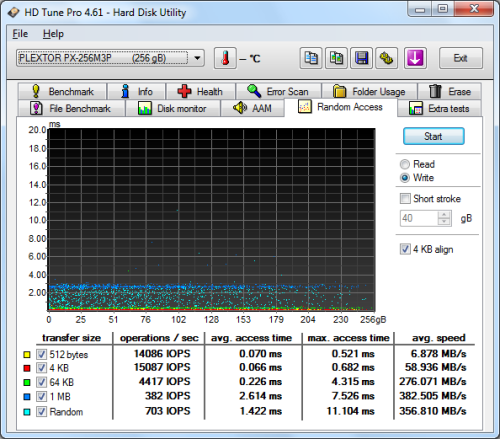AS SSD:
AS SSD is a relatively new benchmark designed specifically for solid state drives. The application contains five synthetic tests used to determine the sequential and random read and write performance of a drive.
AS SSD also includes a copy benchmark. This test copies an ISO (two large files), program (many small files) and game (small and large files), returning the speed and duration of each.
HD Tune Pro 4.61:
Next, I ran a series of tests using HD Tune Pro. This hard disk utility measures a drive's performance by testing its sequential read and write speeds as well as its access time, burst rate and CPU usage. For this review, I'm also going to use it to benchmark the PX-256M3P's random read and write speeds, random access times and the number of operations per second.
The PX-256M3P performed fairly well when benchmarked with HD Tune. The drive had average read and write speeds of 432.4 MB/s and 369.3 MB/s, respectively, and a burst rate of 331.2 MB/s when reading.
The PX-256M3P didn't perform as well as the Extreme when doing random reads and writes. Nevertheless, when writing 4KB blocks, the drive reached 15,087 IOPS and had an average speed of 58.936 MB/s.
Iometer:
Lastly, I ran a series of tests using Iometer. This tool can be configured to benchmark a number of things. In this case, I used it to measure the PX-256M3P's read and write speeds and the number of operations per second. The tests were run using random bytes and a queue depth of 3.

The PX-256M3P's performance was very similar to what we saw in our other tests. The drive was able to read at 509,86 MB/s and write at 422.89 MB/s. This wasn't enough to top the SandForce-based drives when reading and writing highly compressible, repeating data. However, the PX-256M3P had a clear advantage when writing incompressible, random data.

The PX-256M3P performed surprisingly well when doing random reads and writes. In our tests, the drive was able to write at 217.74 MB/s and read at a blazing 146.55 MB/s. This wasn't enough to top the SandForce-based drives when doing random writes with highly compressible, repeating data. However, the PX-256M3P was more than 40 MB/s faster than the SanDisk Extreme and Patriot Pyro SE when writing random data.

According to Plextor, the PX-256M3P is capable of 75,000 IOPS when reading and 68,000 IOPS when writing 4K blocks. In our tests, the drive reached 37,516 random read IOPS and 55,743 random write IOPS. The only way I was able to match Plextor's numbers was to increase the queue depth. With the queue depth set to 32, the PX-235M3P reached 73,709 random read IOPS and 64,329 random write IOPS.













